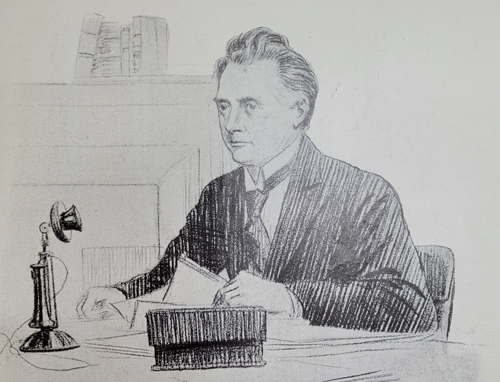Cosgrave appeals to patriotism and civic responsibility to rein in public expenditure
Dublin, 7 October 1922 – Expenditure for the 26 county area from 1 April 1922, when the formal transfer of financial functions from the British government took place, until 31 March 1923 will run to around £37.7 million according to government estimates outlined in Dáil Éireann yesterday.
The scale of the financial burden upon the government is such that President Cosgrave warned that civic responsibility and patriotism would be required if Ireland was to avoid the ‘abject misery’ of some continental European countries. He stated that public expenditure needed to be lowered but he reassured the Irish people that it was not too late to turn ‘from destruction to construction.’
Reporting on yesterday’s Dáil proceedings, the Irish Independent highlighted the fact that abnormal costs had added around £17m to the overall expenditure bill: £10m of this was to cover property compensation claims from before and after the truce. ‘Had the country been normal there is every reason to hold that not only would our accounts balance, but that there would be a substantial surplus.’
British Pathé footage of Executive council minister of the saorstat government.
In the six months from 1 April to the end of September 1922, the Dáil was informed that public expenditure of £9.5 million had been incurred. Of this the chief items of spending were:
• Army £1.86m
• Public Education £1.8m
• Old age pensions £1.2m
• Post Office £1.15m.
The largest sources of revenue during that same period were:
• Excise - £7.9m
• Customs - £1.1m
• Property and Income Tax - £1.1m
• Estate Duties - £418,000
• Corporation Tax Profits £179,000
• Stamps £161,000.
The overall revenue figure was £11.5m, but this, as President Cosgrave explained, should not be taken as representing the ‘true revenue’ of the Irish Free State. For example, a ‘substantial portion’ of the £7.9m excise figure does not belong to the Free State at all because much of the output of Irish breweries and distilleries which have duties collected here are actually removed to Great Britain for consumption.
[Editor's note: This is an article from Century Ireland, a fortnightly online newspaper, written from the perspective of a journalist 100 years ago, based on news reports of the time.]





















